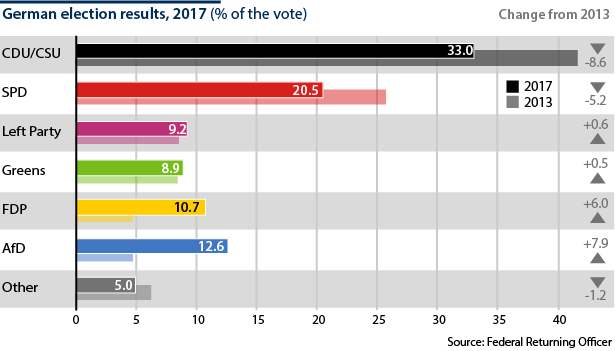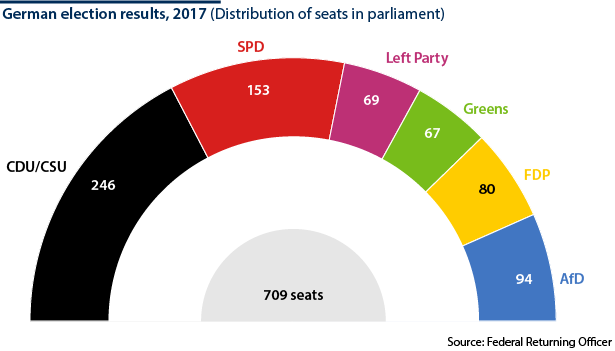German election results point to three-party coalition
Chancellor Merkel is set to continue governing, but coalition negotiations will be tricky
Chancellor Angela Merkel secured a fourth term in office in yesterday’s general election. However, the result is overshadowed by the heavy losses her Christian Democratic Union (CDU) and its Bavarian sister party, the Christian Social Union (CSU), incurred and a surge in support for the far-right populist Alternative for Germany (AfD).
What next
A CDU/CSU-led coalition with the liberal Free Democrats (FDP) and the Greens appears to be the only viable option, but negotiations will be difficult owing to ideological differences. Both the FDP and the Greens will seek to use their bargaining power to extract substantial concessions, fearing that failure to do so could leave them marginalised for the next four years. The CSU’s likely shift to the right will make it an uncomfortable partner for Merkel.
Subsidiary Impacts
- Coalition negotiations will only start in earnest after the regional election in Lower Saxony on October 15.
- A CDU/CSU-FDP-Greens coalition means that the centre-left SPD rather than the AfD will lead the opposition in parliament.
- Neither Merkel nor the FDP are likely to use their political capital to push for a more accommodating German or EU stand on Brexit.
Analysis
The election was a disappointment for Germany's governing parties, the CDU/CSU and its junior coalition partner, the Social Democratic Party (SPD). The CDU/CSU remained the largest party but incurred a record loss, dropping to 33% (based on official provisional results). This is its worst result since 1949 and 8.6 percentage points lower than in 2013.
SPD defeat
The SPD suffered the worst result in its post-war history with 20.5%, 5.2 percentage points down from 2013. This was despite the momentum generated by party leader Martin Schulz at the beginning of the year, when polls put the party above 30%.
The defeat reflects the SPD's difficult strategic position. It struggled to set itself apart from the CDU, as any attack on the government was an attack on its own record.
Moreover, Merkel co-opted traditional centre-left policies, introducing a minimum wage and ending conscription. Increased fragmentation on the left and pressure from the Greens and the Left Party weakened the SPD further (see GERMANY: SPD will struggle to emerge from low point - June 14, 2016).
Schulz has surprisingly ruled out categorically another grand coalition
After conceding defeat, Schulz unexpectedly ruled out categorically a continuation of the grand coalition. It is likely that the party will see a significant overhaul and leadership debate, and Schulz could resign in the medium term.
Fragmented parliament
The main beneficiaries of the election were smaller parties, in particular the FDP and AfD.
The pro-business FDP -- which in 2013 after four years in coalition with the CDU/CSU failed to reach the 5.0% threshold required to enter parliament -- more than doubled its last election result, winning 10.7%. This was likely driven by centring its campaign around charismatic leader Christian Lindner, who had sought to rebrand the party and increase its appeal to younger voters by focusing on issues such as digitalisation.
The Greens reached 8.9% (8.4% in 2013), despite a rather lacklustre campaign that failed to capitalise on issues such as the diesel scandal that touched on the party's core competences of environmental protection and climate change (see GERMANY: Diesel compromise will only buy time - August 3, 2017).
The Left Party also improved slightly, by 0.6 percentage points to 9.2%.
Results for all three parties -- and the AfD -- were higher than in recent opinion polls. This may partly be due to tactical voting.
As many voters -- and international observers -- considered a fourth term for Merkel a foregone conclusion, some tried to influence the shape of the future government and prevent another grand coalition by casting their vote for the FDP or the Greens rather than one of the larger parties (see GERMANY: Election campaign will ignore hard choices - August 30, 2017).
In an Infratest dimap poll released last night, 39% of FPD and 26% of Green Party voters said they chose their party for tactical reasons.
AfD surge
For the first time since 1961, an openly right-wing party will enter parliament.
After failing to reach the 5.0% threshold in 2013, the AfD won 12.6%. It was particularly strong among men living in East Germany: more than one-quarter (26%) voted for the party (see GERMANY: East-West divide will persist - December 22, 2016).
The success of the AfD appears to be driven by protest votes. More than half (60%) of AfD supporters said they voted for the populists owing to disappointment in other parties, rather than conviction.
The AfD appears to be driven by cultural, rather than socioeconomic, factors
Cultural factors and in particular opposition to a cosmopolitan world view appear to have played a stronger role than socioeconomic variables. Age, educational attainment and employment status do not appear to be very strong indicators for support for the AfD, but 85% of the party's supporters said they preferred strong national borders to the country being open to the world, compared to 27% overall.
Almost all AfD voters said they were worried about a loss of German culture (95%), that life in Germany would change too much (94%) and that Islam would have too much influence on the country (92%).
Support for the AfD was also driven by the CDU/CSU's move to the political centre and dissatisfaction with its relatively welcoming migration policy. According to Infratest dimap estimates, the AfD received more than 1 million votes from people who voted for the CDU/CSU in 2013.
Coalition negotiations
As the SPD has ruled out a grand coalition, a three-party government (or four-party, if the CDU and CSU are counted separately) involving the CDU/CSU, the FDP and the Greens appears to be the only viable option -- unprecedented at the national level.
However, coalition negotiations will be difficult, and FDP and Green Party leaders have indicated little enthusiasm. There are ideological differences on many issues:
- the Greens are open to deeper fiscal harmonisation in the euro-area, while the FDP is deeply sceptical;
- the Greens, the FDP and Merkel oppose an upper limit to the number of migrants arriving -- a long-time demand of CSU leader Horst Seehofer; and
- the Greens have called for phasing out combustion engines, which the other parties will oppose.
While the FDP and the Greens may discover some unexpected common ground, for example on a points-based immigration policy, the protection of civil rights or even the legalisation of cannabis, the CSU may pose greater problems.
The CSU may pose the greatest problems in the coalition negotiations
The CSU, which only stands in Bavaria, incurred its worst result since 1949 with 38.5%, down from 49.3% in 2013. This will reopen the conflict between the CDU and the CSU about the future direction of the alliance, especially in light of next year's regional election in Bavaria.
Seehofer said the success of the AfD showed there was space to the right of the CDU/CSU, which he intends to close with "clear political positions" -- a thinly veiled criticism of Merkel's strategy of moving the CDU to the centre. This will likely involve a harder stand on immigration, setting the party on a collision course with its potential coalition partners.
Even if a coalition can be formed, the question of Merkel's succession will complicate cooperation between the parties further. This is likely to be Merkel's final term and the lack of an obvious successor means potential candidates will see the next four years as a chance to raise their profiles -- potentially moving the party further to the right.


_350.jpg)